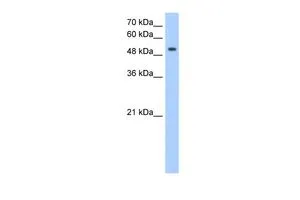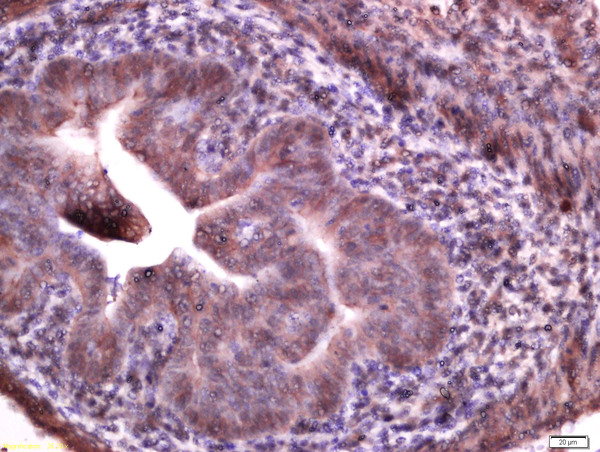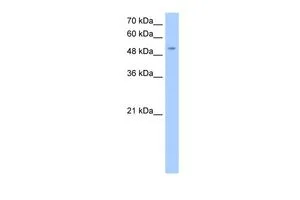
WB analysis of HepG2 cells using GTX46213 MFNG antibody at 0.2-1μg/ml.
MFNG antibody, C-term
GTX46213
ApplicationsWestern Blot
Product group Antibodies
ReactivityHuman
TargetMFNG
Overview
- SupplierGeneTex
- Product NameMFNG antibody, C-term
- Delivery Days Customer9
- Application Supplier NoteWB: 0.2-2.5 ug/ml. *Optimal dilutions/concentrations should be determined by the researcher.Not tested in other applications.
- ApplicationsWestern Blot
- CertificationResearch Use Only
- ClonalityPolyclonal
- Concentration0.5-1 mg/ml
- ConjugateUnconjugated
- Gene ID4242
- Target nameMFNG
- Target descriptionMFNG O-fucosylpeptide 3-beta-N-acetylglucosaminyltransferase
- Target synonymsbeta-1,3-N-acetylglucosaminyltransferase manic fringe, O-fucosylpeptide 3-beta-N-acetylglucosaminyltransferase
- HostRabbit
- IsotypeIgG
- Protein IDO00587
- Protein NameBeta-1,3-N-acetylglucosaminyltransferase manic fringe
- Scientific DescriptionThis gene is a member of the glycosyltransferase 31 gene family. Members of this gene family, which also includes the LFNG (GeneID: 3955) and RFNG (GeneID: 5986) genes, encode evolutionarily conserved glycosyltransferases that act in the Notch signaling pathway to define boundaries during embryonic development. While their genomic structure is distinct from other glycosyltransferases, these proteins have a fucose-specific beta-1,3-N-acetylglucosaminyltransferase activity that leads to elongation of O-linked fucose residues on Notch, which alters Notch signaling. The protein encoded by this gene may control Notch signaling in claudin-low breast cancer. [provided by RefSeq, May 2018]
- ReactivityHuman
- Storage Instruction-20°C or -80°C,2°C to 8°C
- UNSPSC12352203






